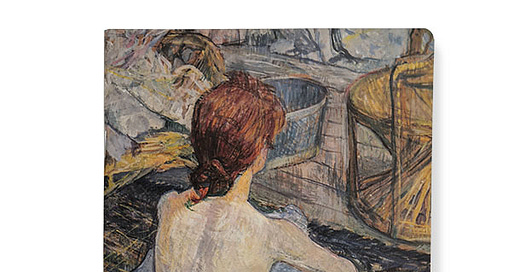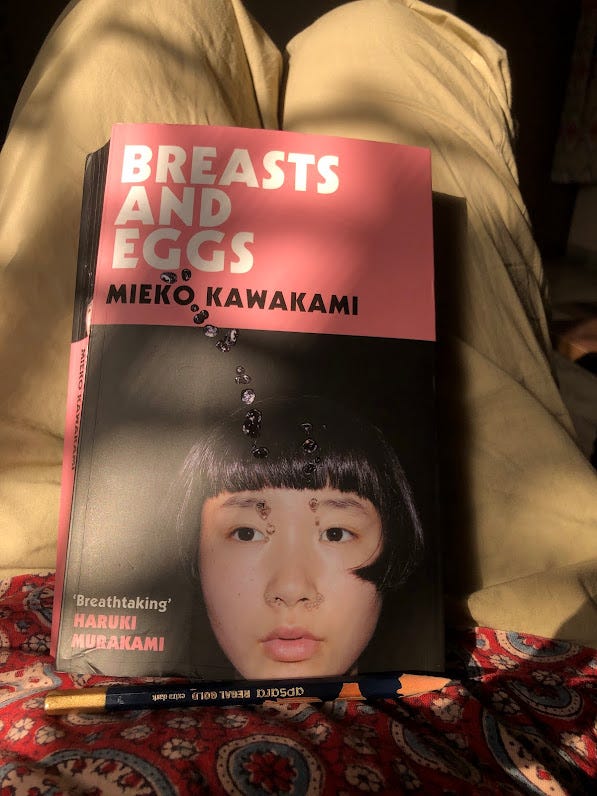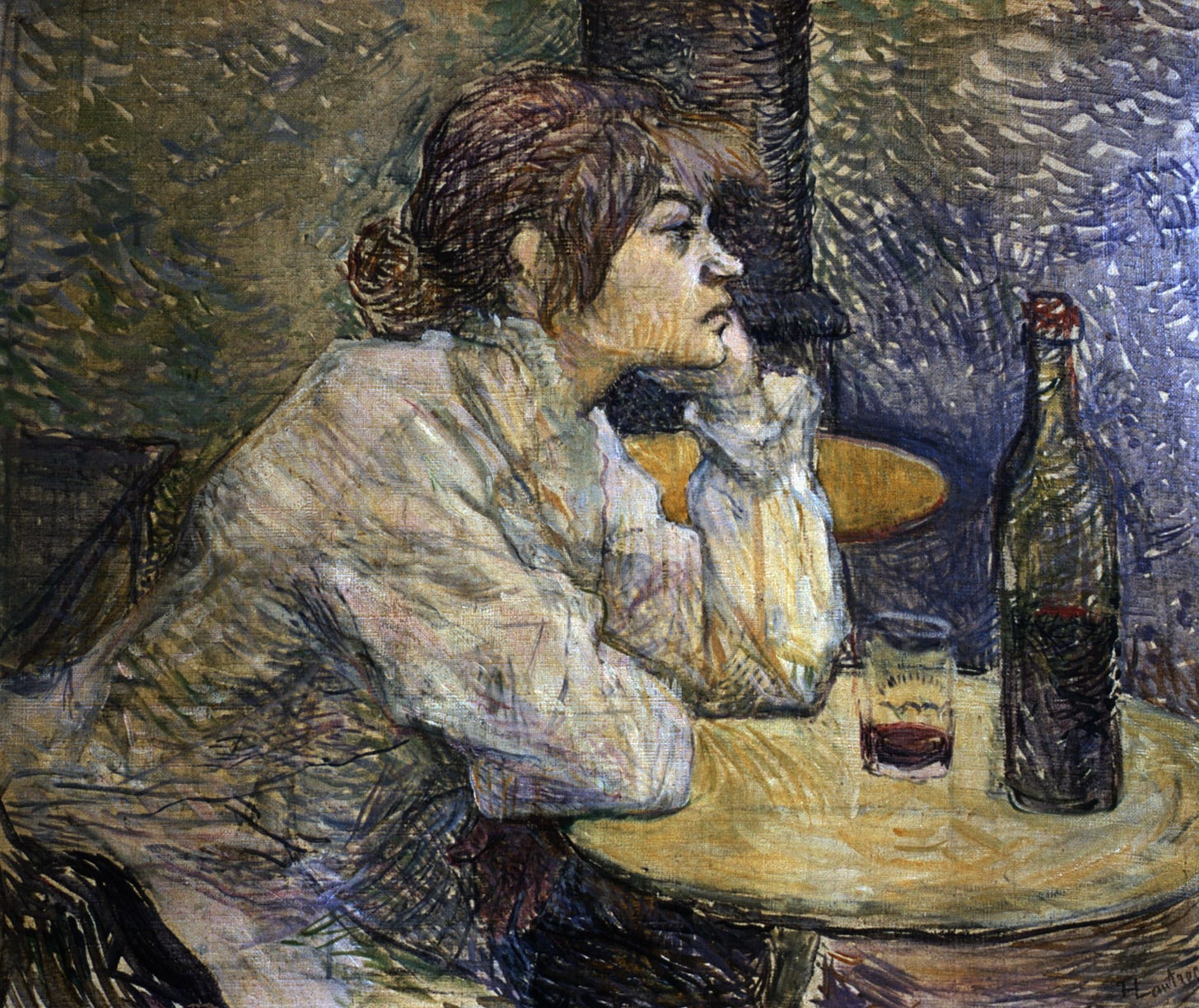#Scurf109: Breast and Eggs and the deeper conversation about friendships
On feeling seen by Meiko Kawakami's 'Breast and Eggs' (written in May 2021)
The sincerity of Meiko Kawakami — she writes about the state of humanity, the peculiarity of being a woman in the present times with such precision, casting a keen but non judgmental glance on what it actually feels like to be a woman in the 21st century. The book elevates the conversation from beyond the immediate, banal and obvious to a considered evaluation of how we reached here. The women in this book are not easily attached. They do not get sentimental about very many things. A sense of unfazed cadence dictates their everyday life, even a measure of levity.
Natsu is unconcerned about most immediate things in her life — from her job which is to write the one book, to her friends, to her sister. She lacks ambition in most spheres, is not motivated and suffers from a touch of constant melancholy. Romance doesn't matter to her. Sex doesn't entertain her. Her sister's life and whereabouts bother her. She is constantly in the know of what is happening to her sister and her niece and is also emotionally invested in their lives. She is even mildly piqued by the love life of her niece. Memories from her childhood, thoughts about her mother, and recollections about her grandmother are the stuff she is aware about and cares to think about. She wants to make it as a writer, but there too she lacks a proper motivation and drive. It is through her career as a writer that she meets most of the friends in her life.
She is not invested in taking the friendships to a deeper level, because Natsu has had a history of trauma. She is interested in a man but that too is only at a superficial level. She doesn't want to know him romantically or as a friend, but she wants to know his life story for other reasons that interest her. Above all, she is deeply invested in the pursuit of creating a human baby of her own and having a relationship with it.
Unmoved by all other kinds of relationships she encounters in life, Natsu focuses all her energies to securing a definite answer to this one craving. She begins to nurture this curiosity like an intellectual query, she ruminates, pokes and dabbles with the idea. Her interest in the man also arises from this position of inquisitiveness. It's a curiosity she aims to scratch at first by amassing as much knowledge as she can on the topic, and then by giving birth. Unfazed, she talks to people, entertaining their curiosities as a way of quenching her desire to know more about the human condition. Conversations with friends, near strangers and acquaintances are her way of getting to know about the lives of other people. The bare moorings of being human amuse her as much as being able to give birth. Endowed with intellect and a penchant for being curious, she gathers information needed and beyond by meeting with friends. She upholds her pathological desire to meet with her child, and pursues that.
There is a tendency in me to rue the fact that I do not have many close friends. Devoid of any long lasting school time or other childhood friendships, at the age of 30, I am keenly aware of the fact that from now on, it is only going to get harder to make friends. Kawakami's Natsu appears to have similar moorings.
In her present life, she is too occupied with her intellectual cravings, to be able to pay heed to much else. While growing up, she did not have the luxury of time that other kids her age had. Growing up in a middle income household, more often than not I would be at home helping parents with one or the other kind of work. I seldom was able to meet friends at gatherings and parties because my father didn't allow me to. Natsu, like me, was too engrossed in poverty, sadness, desperation and desolation as a child to be able to forge relationships.
She was too engrossed to have been able to swim out of her own ablutions and engage with people around and make neat friendships, subliminally making misery her only companion. And she, reluctantly and unwittingly so, carries this sense of being left behind along with her well into adulthood. This lends to her an air of constant iridescence and sadness. Similarly, with me, I did not find the time to get out of my own head and misfortunes so as to be able to indulge in the other free things life offered — friendships, banter and conversation.
Leeching off those lacks till now, I still find myself unable to appreciate people for what they are. Growing up like that leaves an indelible mark on the conscience of a person. Like me, Natsu too, is weary of people. We are both always constantly unable to fathom why someone would want to be friends with us, what good a friendship could result into, keeping all the people we meet at bay. On the one hand she hides things from the people she meets, while on the other, she reveals her bare bone secrets to mere strangers. This kind of undulating duality marks her character. This imbalance exists poignantly perched in the life of many people like her who have had a bad childhood. The trauma makes them different, and it’s commendable to see a character thwarted with such flaws as a protagonist.
An afterthought from May 2021 (surprising that I’d scribbled this on email at all):
The steely silence on my WhatsApp makes me anxious. I want to chat with people, friends, acquaintances, I want to know if they and their loved ones are fine. But for every conversation I manage to start, I lose two more hours of sleep.
I come to twitter more often than prescribed because the chatter here somehow feels homely. The outpouring of grief, of sadness, of all the illness, makes me feel like I’m a part of something as opposed to the curdling loneliness in my flat in the geriatric silence of these days.
The 2021 lockdowns are making me realise how hard all of living is. Each move is also laced with such poignance, the smallest of movements can be rendered so meaningful, meaningless depending on the most minuscule of factors.
Scrolling socials, drinking water, stirring Ensure into my nightly glass of milk, taking a three minute walk in the house, looking for a vax slot for someone, talking, sitting up, breathing right, eating well — each one of these tasks, tiny one moment, gargantuan the other.
I have not had the time to cry, or be sad or to overthink or be anxious. Everything is happening on its own and all the time. Ten days back one night I my motions wouldn’t stop and I thought that’s how it goes.
But the next morning a friend offered to send us meals, doing for us the work of god. Every bit of living is fighting against the slush pile, holding on to the tiniest grain of hope.
Even shuffling in bed, coughing hoarsely, in the empty hours of the night, I remember to be grateful, to have patience and love for the person sleeping next to me. This threadbare kind of living doesn’t sit too well on most of us, but we’re all trying. We’re all in this together. And perhaps that is some solace.
Some of my recent work:
I reviewed Jhumpa Lahiri’s latest collection of essays ‘Translating Myself and Others’ for Frieze
I reviewed Naheed Phiroze Patel’s ‘Mirror Made of Rain’ for the LA Review of Books
For Electric Literature I wrote about how leaving home meant losing my mother tongue, or at least my touch with it.
For more, you can head over to my contently page
https://anandimishra.contently.com/
Aufweidersehen: I will soon be branching out from Contently and over to a Wordpress, or SquareSpace page, something more professional. If any of you could help me out in the process, the how-tos of it, navigating the setting up phase, etc., that’ll be awesome! Coffee or a book will be on me. Also, if you liked reading this, consider sharing it with friends?
Follow me on IG, Twitter, LinkedIn.
Credit: Art by Henri de Toulouse-Lautrec.







